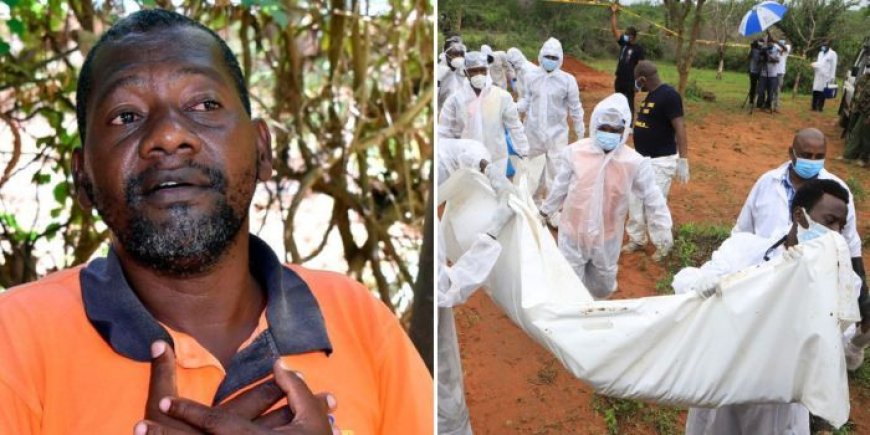Kenyan Pastor Investigated for Alleged Cult Activities and Sexual Abuse in Meru County
A Kenyan pastor, Daniel Mururu, and church elders from the East African Pentecostal Churches of Kenya are under investigation for allegedly running a cult and sexually abusing women and girls in Meru County. The victims, aged 17 to 70, were reportedly coerced into indecent acts under the threat of punishment. The case came to light after locals torched the church in anger. This follows a pattern of growing concerns over unregulated religious groups in Kenya, reminiscent of the "Shakahola forest massacre," where hundreds of bodies were discovered in a doomsday cult last year.

In a disturbing case that has shocked the nation, a pastor in Meru County is under investigation for alleged cult activities and sexual abuse. The pastor, Daniel Mururu, along with other elders from the East African Pentecostal Churches of Kenya, is accused of indecently assaulting multiple women and girls, according to a police report dated Monday. This revelation has further intensified the growing concern over the spread of criminal activities within religious organizations in Kenya.
The case came to light after Mururu's church in Meru County was torched by outraged locals last month. The anger in the community reportedly boiled over when details of the abuses surfaced, pushing residents to act in retaliation. Mururu, along with several church elders and ushers, faces serious allegations including the stripping of women naked, shaving their pubic hair, and forcing them into sexual acts. The victims are said to include girls and women aged between 17 and 70 years, with one 17-year-old schoolgirl becoming pregnant after the abuse.
According to police investigations, Mururu is believed to have been running a cult that had brainwashed and radicalized its members. Churchgoers were coerced into performing indecent acts under the threat of punishment, such as sickness or barrenness, should they refuse to comply with the pastor's orders.
This case echoes broader concerns over unregulated churches in Kenya, many of which have been accused of criminal activity, exploitation, and in some cases, cult-like behavior. Kenya, a devoutly Christian country, has seen a surge in the number of independent churches, some of which exploit vulnerable populations for financial or sexual gain.
A Pattern of Abuse
This incident brings back memories of another horrendous case from last year, the "Shakahola forest massacre." The leader of a doomsday starvation cult, also based in Kenya, was arrested after hundreds of bodies were discovered in mass graves near Malindi. A total of 448 bodies were unearthed, many of whom died of starvation, though autopsies revealed some victims, including children, had been strangled, beaten, or suffocated.

Inset: Pastor Mackenzie (Left), the Shakahola Massacre mastermind, (right) health workers and security operatives during an excavation exercise at the Shakahola Massacre crime scene.
The Shakahola case sent shockwaves across the globe, highlighting the urgent need for the government to regulate rogue religious organizations. Authorities flagged the need for tighter control over fringe denominations and cult-like sects. However, cases like that of Daniel Mururu suggest that more needs to be done to protect citizens from unscrupulous religious leaders.
A Call for Government Action
While Kenya prides itself on its religious diversity and tolerance, the rise of criminal activities within certain churches threatens the very fabric of the country's devout society. The government, after the Shakahola massacre, pledged to tighten control over religious institutions. This latest incident in Meru highlights the need for faster and more effective regulation.
Kenya's religious landscape is diverse, with numerous Christian denominations making up the majority. However, as fringe movements continue to gain influence, the government's regulatory framework has struggled to keep up, leaving room for exploitation and abuse. Investigations into Mururu's church may reveal further systemic failures in protecting vulnerable members of religious communities.
For now, the focus is on justice for the victims of this heinous abuse. The police have confirmed that investigations are ongoing, and the public awaits accountability not only from those involved in the assault but also from a system that allowed such abuse to fester within a religious organization.
The Way Forward
This case underscores the urgency for Kenya's leadership to institute meaningful reforms in the oversight of religious institutions. Churches and religious groups play a crucial role in the social and spiritual lives of many Kenyans. However, when religious figures use their influence to exploit, abuse, or harm their followers, it represents a betrayal of trust that should never be allowed to go unpunished.
As the investigation unfolds, Kenyans are reminded of the need to remain vigilant and cautious of religious figures who demand blind obedience or engage in unorthodox practices. The challenge ahead lies in striking a balance between religious freedom and ensuring that no one uses the cover of faith to commit crimes.
The case of Pastor Mururu may serve as another grim reminder of the potential dangers lurking within Kenya’s unregulated religious institutions—dangers that require immediate and decisive action to prevent further tragedies.
What's Your Reaction?















































































































